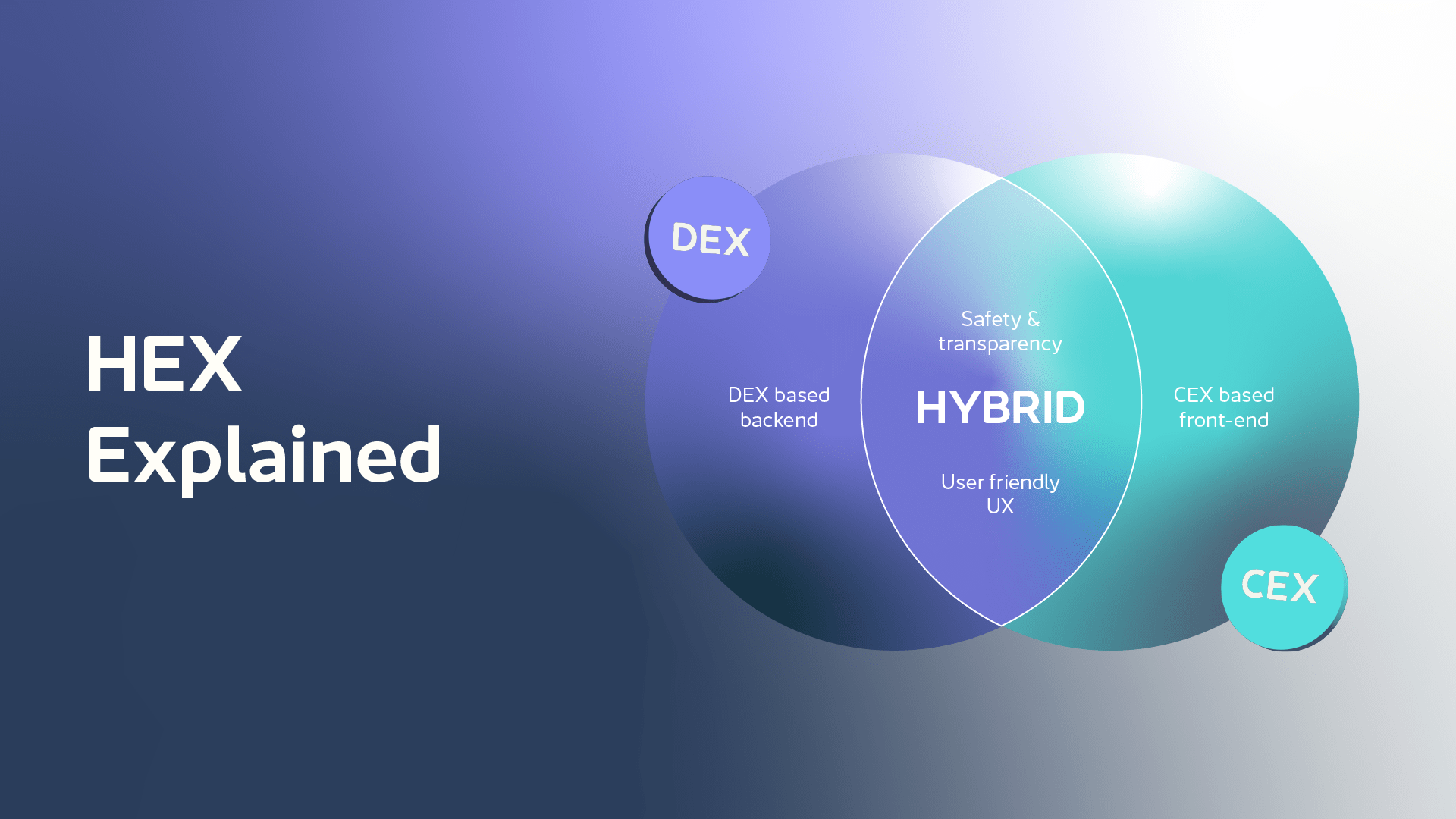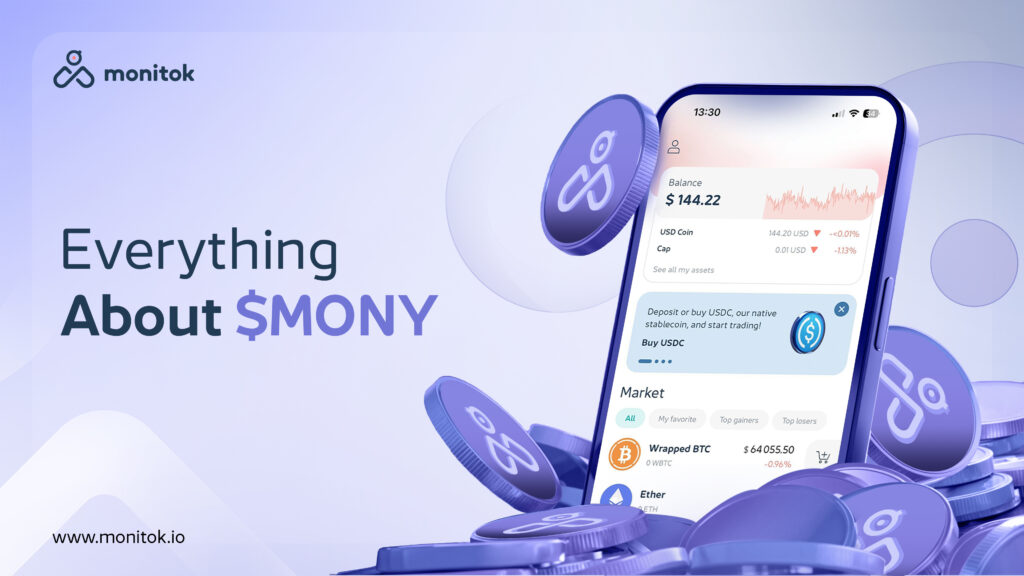As the crypto landscape evolves, hybrid crypto exchanges are emerging as the frontrunners. Why is this transformation happening?
The world of cryptocurrency is ever-evolving, and with it comes the need for secure and efficient trading platforms. Enter hybrid crypto exchanges, a blend of the best features from both centralized and decentralized models. But what makes them the go-to choice for modern traders? Let’s start from the beginning 👇
What are cryptocurrency exchanges?
A cryptocurrency exchange, or a digital currency exchange, is a business that allows customers to trade cryptocurrencies or digital currencies for other assets, such as conventional fiat money or other digital currencies.
Cryptocurrency exchanges are more than just platforms for trading digital currencies. They’re the heartbeat of the crypto ecosystem, dictating the pace, liquidity, and value of different cryptocurrencies.
Types of Crypto Exchanges: A Deep Dive
Centralized Crypto Exchanges (CEX): What is a centralized exchange?
Centralized exchanges, like Binance and Coinbase, are managed by single entities. They’re known for their user-friendly interfaces, custodial wallets, and comprehensive regulatory frameworks.
A centralized exchange functions similarly to a conventional stock market. Serving as an intermediary, they pair up buyers with sellers and are typically viewed as more secure and dependable than decentralized exchanges. This trust is evident as centralized exchanges dominate the market, handling 95% of all trades.
Features of Centralized Exchanges
Some of the features centralized exchanges hold are:
Convenient Mobile User Interface
They offer a user-friendly mobile interface for seamless trading on the go. This ensures that traders can access their accounts and execute trades anytime, anywhere, enhancing flexibility.
Custodial Wallet
A custodial wallet is defined as a wallet in which the private keys are held by a third party. This means that the third party has full control over your funds while you only have to give permission to send or receive payments.
They provide custodial wallets, ensuring that users’ assets are securely managed and stored. This offers peace of mind to users, knowing that their funds are in safe hands.
Order Book
With an order book system in place, users can view real-time buy and sell orders. This feature enhances transparency in trading, allowing users to make informed decisions based on market demand.
Banking Features
They incorporate banking features such as on/off ramps, payment with cards, and crypto credit cards. This facilitates easy fiat-to-crypto transactions, bridging the gap between traditional banking and the crypto world.
Augmented Convenience Features
Enhanced convenience features, including customer support and asset recovery, are integral to centralized exchanges. These features elevate the user experience, ensuring that users have the support they need when they need it.
Wide Accessibility
The platforms of centralized exchanges are designed for wide accessibility. Whether on the web, mobile, or browser extensions, users can easily access their accounts and trade across various devices.
Regulatory Framework
Adherence to a regulatory framework encompassing KYC, AML, GDPR, financial auditing, and insurance of funds is a hallmark of centralized exchanges. Regulated crypto exchanges need to comply with laws and maintain transparency in their financial operations. This contributes to the stability of the organization and the security of individual assets and data.
Faster and Cheaper than DEX
When it comes to speed and cost, centralized exchanges have an edge. Transactions are quick and at low cost as they dont need to use blockchain and different networks, they can batch transactions and produce more cost effective trading.
However, did you know that they control the private keys of the assets you deposit? When we look at centralized exchanges vs. decentralized exchanges, this is a certain stepback for centralized exchanges and a crucial pro for decentralized exchanges.
Decentralized Exchanges (DEX): What is a decentralized exchange?
A decentralized cryptocurrency exchange, known as DEX, stands in contrast to its centralized counterpart. It operates without a governing company, entity, or individual. Transactions on a DEX are direct peer-to-peer, devoid of intermediaries, and autonomously managed by algorithms termed smart contracts.
Platforms like Uniswap operate without a central authority. They prioritize security, allowing peer-to-peer trading and ensuring users retain control of their private keys. But while they offer unmatched security, they can sometimes be less intuitive for new users.
DEXes function on the foundation of blockchain technology and necessitate users to have cryptocurrency wallets to store their tokens. Before executing a transaction, these wallets must be linked to the exchange. On the other hand, centralized exchanges act similarly to banks, retaining your assets and ensuring their security.
The Features of decentralized exchanges
Let’s see some of the features of decentralized exchanges:
Non-custodial Wallet
They prioritize user autonomy by offering self-custodial wallets as no third party has access to the keys. This ensures that users have complete control over their private keys and assets, emphasizing full ownership and security.
Automated Market Maker (AMM)
They often employ automated market makers (AMM) to ensure liquidity. This system facilitates direct peer-to-peer trading, eliminating the need for intermediaries and enhancing the efficiency of trades.
Anonymous Trading
One of the standout features of decentralized exchanges is that there is no need for regulations which require KYC and identity revealing about who owns the wallet.
No Regulation
Operating outside the realm of traditional financial oversight, decentralized exchanges are not bound by standard regulations. This offers a level of freedom but also requires users to exercise caution and due diligence.
Decentralized and No Support for Users
The decentralized nature of these exchanges means they operate without a central governing body. As a result, they typically lack centralized customer support, placing the onus on users to navigate and resolve issues independently.
No Fiat On-ramp
Decentralized exchanges are primarily crypto-focused, meaning they often don’t facilitate direct fiat currency deposits or withdrawals. This can limit their accessibility for those looking to transition between traditional currencies and cryptocurrencies.
Hybrid Crypto Exchanges (HEX): What is a hybrid exchange?
Hybrid exchanges combine features from both the CEX and DEX platforms.
They offer users autonomy over their assets, akin to decentralized exchanges, while striving for the speed and user-friendliness characteristic of centralized ones. Additionally, they’re crafted for enhanced scalability and reduced transaction costs.
Hybrid platforms employ an escrow mechanism to safeguard assets during trades, mirroring the liquidity approach of centralized exchanges. This eliminates the need for user-driven liquidity, typical of decentralized exchanges, ensuring faster transactions and avoiding the high slippage fees DEXes face during low trading volumes.
Leveraging blockchain technology, hybrid exchanges, given their edge over conventional decentralized platforms, are poised to significantly influence the cryptocurrency domain in the upcoming years.
Types of Hybrid Exchanges
Types of hybrid exchanges include order book DEXes, automated market makers (AMMs), and DEX aggregators.
Order book DEXes
Order book DEXes in hybrid exchanges utilize a system where buy and sell orders are listed in real-time, allowing traders to directly match with available offers, ensuring transparency and depth in trading. This approach mirrors traditional trading platforms but operates in a decentralized environment.
Automated market makers (AMMs)
Automated market makers (AMMs) in hybrid settings automatically set and adjust the prices of cryptocurrencies based on mathematical formulas, eliminating the need for order books. This ensures constant liquidity and allows users to trade without waiting for a counterparty.
DEX aggregators
DEX aggregators function by sourcing liquidity from various decentralized exchanges, optimizing trades for users. By scanning multiple platforms, they ensure traders get the best possible rates and reduce the slippage often associated with decentralized trading.
Features of Hybrid Crypto Exchanges
Features of hybrid crypto exchanges include:
Convenient Interface
Hybrid crypto exchanges prioritize the user experience by offering a user-friendly interface. This design approach ensures that both novice and seasoned traders can navigate and execute trades with ease.
Self-Custodial Wallet
Just like DEXes, they prioritize user autonomy by offering non-custodial wallets as no third party has access to the keys. This ensures that users have complete control over their private keys and assets, emphasizing full ownership and security.
Safety is paramount in hybrid exchanges, and they underscore this by providing custodial wallets. This feature ensures that users’ assets are stored securely, offering peace of mind in the trading process.
DEX Trading
One of the standout features of hybrid platforms is their support for DEX trading methods. Whether it’s order books, automated market makers (AMMs), or liquidity aggregation, hybrid exchanges integrate these features to offer a comprehensive trading experience.
Regulation
Hybrid exchanges recognize the importance of trust and security. To this end, they adhere to specific regulatory standards, striking a balance between offering user autonomy and ensuring compliance with established financial norms.
Banking Features
Bridging the traditional and crypto financial worlds, hybrid exchanges incorporate essential banking features. With tools like on-ramp, they simplify the process of fiat-to-crypto transactions, making it easier for users to transition between different financial systems.
All types of exchanges have their pros & cons, like anything else in life! However, CEXes & DEXes have some limitations compared to HEXes.
Limitations of CEX & DEX: Why HEX is the Future
While CEX platforms are user-friendly, they often compromise on security. DEXes, on the other hand, prioritize security but can be less intuitive.
HEX platforms bridge these gaps, offering a perfect blend of security, convenience, and liquidity. With features like enhanced user control, robust security measures, and a wide range of trading options, HEX platforms are poised to dominate the crypto trading landscape.
Comparative Analysis: CEX vs. DEX vs. HEX
User Experience & Convenience: HEX platforms offer an intuitive, user-friendly experience including customer support without compromising on security.
Asset Control & Decentralized Trading: Unlike CEX platforms where assets are deposited, HEX ensures users retain control of their private keys, much like DEXs.
Efficiency: HEX platforms combine the speed of CEX platforms with the security of DEXs, offering efficient and secure trading.
Banking Features: HEX includes fiat on ramp and off ramp, while being regulated and compliant as most financial institutions.
Here is an overview comparison of all three exchange types:
Advantages
Centralized Crypto Exchanges
- Supports fiat and digital currencies.
- More user-friendly & stable than DEX.
- Customer support is available.
- Typically have cheaper transaction fees.
Decentralized Crypto Exchanges
- Not regulated, which means more freedom.
- No identity checks are required, which allows anonymous trading.
- Less susceptible to market manipulation
- More secure.
Hybrid Crypto Exchanges
- Supports fiat & digital currencies.
- More user-friendly than DEX.
- Better scalability than DEX, meaning fast processing even when large volumes of transactions take place.
- Less regulation than CEX.
- Security is enhanced by private ownership of the assets.
- More liquidity compared to DEX
Disadvantages
Centralized Crypto Exchanges
- Custodial wallet, meaning assets do not belong to the users.
- No or few transparency of what is going on financially with the exchange or your assets.
- The size & nature of CEX makes it an easier target for hackers.
- Regulated by authorities and obliged to show any financial document when requested.
Decentralized Crypto Exchanges
- Harder to get onboarded without prior knowledge about crypto.
- Do not support fiat transactions.
- Little to no support for users.
- Higher trading price compared to CEX
Hybrid Crypto Exchanges
- Less privacy than DEX
Monitok: Leading the HEX Revolution
Monitok is a next-generation hybrid crypto exchange (HEX) that seamlessly integrates the advantages of both centralized and decentralized trading platforms. Offering a highly intuitive mobile app, Monitok ensures users have absolute control over their crypto assets, emphasizing full ownership and transparency. Monitok has no access to private keys and private keys/mnemonics are not leaving the app. Users have the option to store their private key on a piece of paper, or they can choose to store an encrypted version of the private key on their digital device or in the cloud for easier recovery.
The platform a mixture of features such as a built-in decentralized wallet, encrypted private key recovery, two-step verification, and biometric sign-in. Traders can access over 100+ crypto tokens across 98 DEXes on the Arbitrum network, ensuring they always get the best rates with minimal fees.
Additionally, Monitok provides staking opportunities with attractive returns, peer-to-peer transfers, fiat on/off ramps, and a crypto debit card. With its commitment to combining flexibility, reliability, and user-centric features, Monitok is poised to set new standards in the crypto trading landscape.
Monitok is built with the future of hybrid trading in mind, because we believe that hybrid exchanges is the “next big thing” in crypto trading. Why? 👇
The Ripple Effect of HEX on Crypto
Hybrid exchanges are more than just platforms; they’re game-changers. They’re influencing trading strategies, liquidity management, and even the future evolution of crypto exchanges. As we look ahead, the importance and potential of HEX platforms in shaping the crypto world cannot be overstated.
With enhanced HEX liquidity solutions such as security, banking features, liquidity, regulations and user experience & convenience, they ensure optimal trading rates and swift transactions, making them appealing to a broad spectrum of traders.
Hybrid crypto exchanges are not just a trend; they’re the future. As the crypto world continues to evolve, these platforms are perfectly poised to lead the charge, offering traders the perfect blend of security and convenience.
Ready to dive into the world of HEX? Join us on our journey 👇
Frequently Asked Questions
Centralized Exchanges (CEX): These are managed by centralized organizations or companies. They act as intermediaries between buyers and sellers, offering a platform for trading cryptocurrencies. Examples include Binance, Coinbase, and Kraken.
Decentralized Exchanges (DEX): These operate without a central authority and facilitate peer-to-peer trading directly between users. They rely on smart contracts and blockchain technology to automate and secure transactions. Examples include Uniswap, SushiSwap, and PancakeSwap.
Hybrid Exchanges (HEX): These combine features from both centralized and decentralized models. They aim to offer the security and user control of DEXs while providing the speed, liquidity, and user-friendly interface of CEXs.
A HEX blends the strengths of both CEX and DEX. Compared to centralized vs. decentralized exchanges, a HEX offers the user-friendliness and speed of a CEX while retaining the security and autonomy of a DEX. In decentralized vs hybrid exchanges, HEX provides enhanced liquidity and efficiency without sacrificing user control. And in centralized vs hybrid exchanges, while both offer a streamlined experience, HEX ensures greater user asset control and decentralized features.
Here are some examples of different types of crypto exchanges:
CEX: Binance, Coinbase, Kraken
DEX: Uniswap, SushiSwap, PancakeSwap
HEX: Monitok, GRVT, C3
Using a HEX offers the user-friendliness of CEX combined with the security of DEX. HEX ensures optimal trading rates, faster transactions, and greater user autonomy while often adhering to regulatory standards, making it a balanced choice for crypto trading.
They offer the convenience of CEX platforms and the security of DEX platforms, making them the ideal choice for modern traders.
Through features like self-custody, two-factor authentication, cold storage, compliance to regulations and regular security audits.
Most HEX platforms support a wide range of cryptocurrencies, offering traders immense flexibility.



